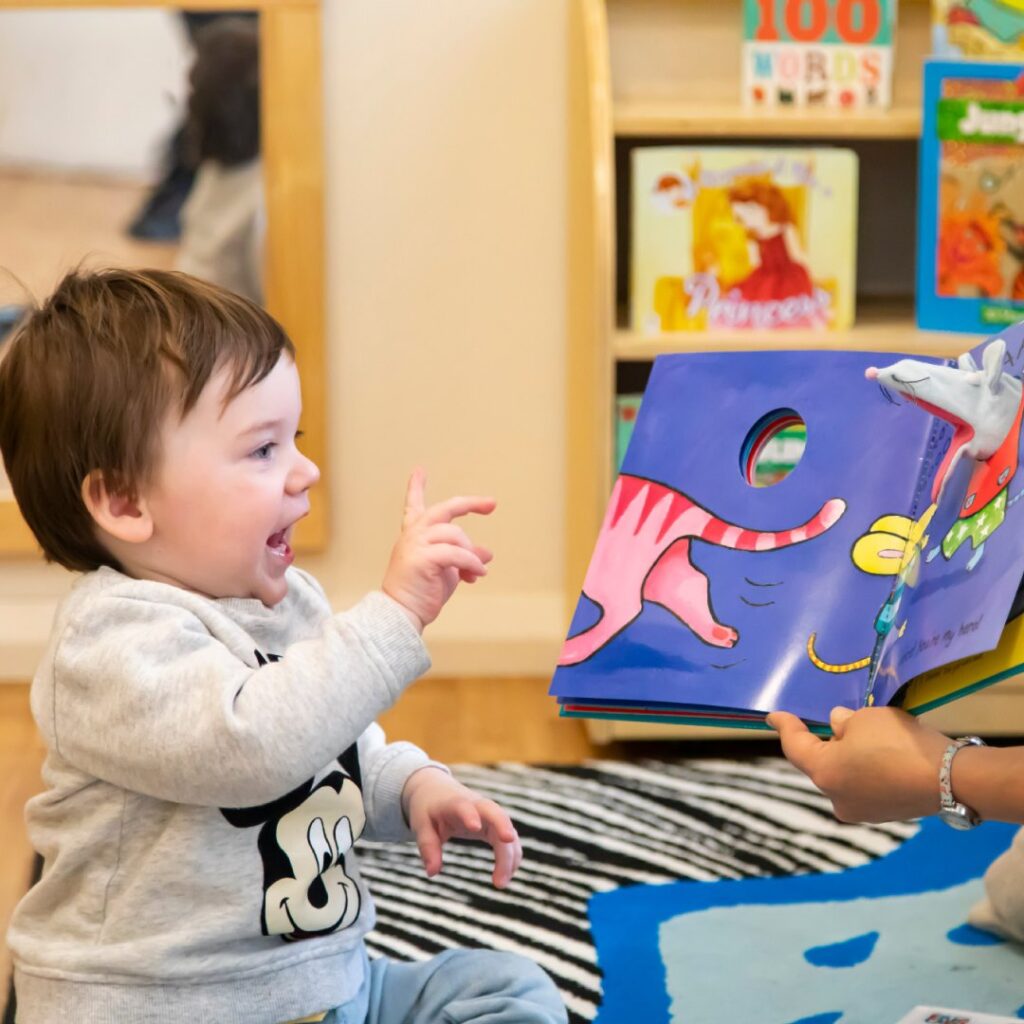 Book a Tour
Book a Tour WhatsApp
WhatsApp Join Waitlist
Join Waitlist
Reading and comprehension skills should be fostered effectively from a young age. These are one of the biggest indicators of positive educational outcomes for your child, contributing to their likelihood of future success. Parents and caregivers provide a crucial role in building these skills, so it’s important to begin engaging your child in relevant activities from a young age. Check out Mem Fox’s 10 commandments of reading aloud for some creative inspiration. Children between 0-5 enrolled in childcare spend, on average, half their days there, so it’s important to know whether your centre places an emphasis on reading. In this blog, we’ll explore ten things you can do to improve your child’s reading and comprehension skills.
 </p style=”text-align: center;”>
</p style=”text-align: center;”>
1. Read to your child every day
Reading aloud to your child is one of the most effective ways to promote a love of reading and improve their comprehension skills. Reading together can help your child build vocabulary, learn sentence structure, and understand the meaning of words in context. You can make the activity special by picking a designated reading nook for maximum comfort. Heritage House has a reading space that combines plush seating and soft lighting to make reading an enjoyable part of each child’s daily routine.
2. Encourage your child to read independently
Encourage your child to read on their own, even if they are not yet able to read fluently. Start with picture books and gradually introduce books with more words and longer sentences. Let your child choose the books they want to read to keep them engaged and motivated.
3. Discuss what you read
After reading a story, ask your child questions about what happened in the story, the characters, and the setting. Asking for their preferences, favourites, and opinions will help your child develop their comprehension skills and encourage them to think critically about what they read.
4. Play word games
Playing word games can help your child develop their vocabulary, spelling, and reading skills. Games like Scrabble, Boggle, and Hangman are fun and educational. You can also make up your own games, like word bingo or word searches, to keep things interesting.
5. Make reading a family activity
Make reading a family activity by setting aside time each week to read together. Choose a book that everyone in the family can enjoy, and take turns reading aloud. This will not only improve your child’s reading and comprehension skills but also create a strong family bond around reading. Children naturally imitate parents and adults to learn acceptable behaviour. Use their natural tendency toward mimicry to instil positive habits in your child, and yourself.
6. Use technology
Technology can be an excellent tool for improving reading and comprehension skills. There are many reading apps and programs that can help your child learn to read and understand what they are reading – reading eggs is a great tool. Do some research, or ask your educators for some great online resources to supplement your child’s learning.
7. Develop your child’s general knowledge
General knowledge is essential for understanding what you read. Encourage your child to learn about different subjects, such as history, science, and nature. Take trips to museums, zoos, and other educational places to expose your child to new ideas and concepts. At Heritage House, we understand that daycare is a big part of your child’s life, and so we host a varied range of incursions to get your child excited about new subjects. Our language classes provide a prelude to learning diversity and culture. Our Sonic Kitchen was a huge hit and introduced the centre to chemical reactions and science experiments. This kind of varied exposure is what you should endeavour to add to your child’s life to build their general knowledge, and even get them excited about new things to read.
8. Write and draw about what you read
Writing and drawing about what you read can help your child develop their comprehension skills. Our educators encourage children to write a short summary of the story, draw a picture of their favourite character, or write a letter to one of the characters. This activity can be replicated at home and will help children engage with the story and improve their understanding.
9. Make reading fun
Reading should be a fun and enjoyable activity. Encourage your child to read books that interest them, whether it’s comic books, graphic novels, or fiction. Read outside in a park or in a treehouse to create a unique reading experience.
10. Model good reading habits
Children learn by example, so model good reading habits by reading in front of your child. Let them see you read books, newspapers, or magazines. Talk about what you are reading and why you enjoy it. This will show your child that reading is an important and enjoyable activity.
In conclusion, there are many things parents and caregivers can do to improve a child’s reading and comprehension skills. By reading together, playing word games, and discussing what you read, you can help your child develop a love of reading that will last a lifetime. Encourage your child to read independently, use technology, and build their general knowledge to improve their comprehension skills.